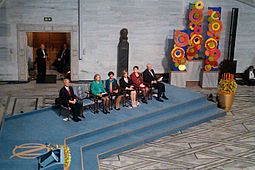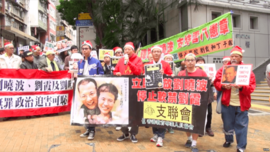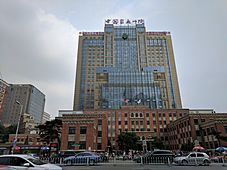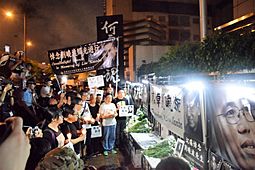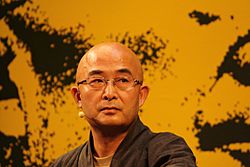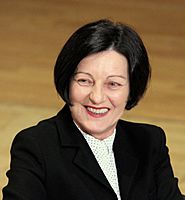Liu Xia (poet) facts for kids
Quick facts for kids
Liu Xia
|
|
|---|---|
| 刘霞 | |
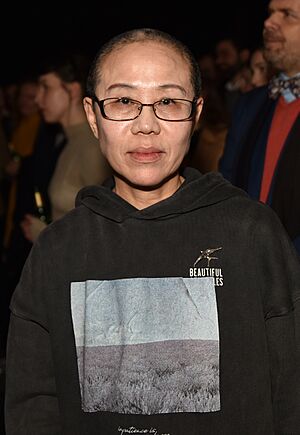
Liu Xia in 2024
|
|
| Born | 1 April 1961 Beijing, China
|
| Nationality | German |
| Occupation | poet, painter, photographer |
| Spouse(s) | |
| Liu Xia | |||||||
|---|---|---|---|---|---|---|---|
| Simplified Chinese | 刘霞 | ||||||
| Traditional Chinese | 劉霞 | ||||||
|
|||||||
Liu Xia (Chinese: 刘霞; born on April 1, 1961, in Beijing, China) is a talented Chinese painter, poet, and photographer. For many years, Liu Xia was kept under house arrest in China. This happened because her husband, Liu Xiaobo, was given the Nobel Peace Prize in 2010. She was finally allowed to travel to Germany for medical help on July 10, 2018.
Contents
About Liu Xia's Life
Liu Xia used to work for the government in Beijing. She met her husband, Liu Xiaobo, in the 1980s. They were both part of a group of writers and artists in Beijing. She married Liu Xiaobo in 1996 while he was in a labor camp in China.
Liu Xia liked to live a quiet life, focusing on her art and writing. However, because her husband was an activist who was often imprisoned, she had to speak out for him. She was seen as his most important link to the outside world. Because she was married to a famous human rights supporter, Chinese authorities put pressure on her. She lived under constant watch after her husband was arrested. Even when he was in prison, she continued to speak about human rights. She did this for herself and for him, even though it was difficult.
Liu Xiaobo and Charter 08
Liu Xiaobo was sentenced to 11 years in prison after he helped write a document called Charter 08. This document asked for more freedom and different political parties in China. Liu Xia had asked her husband not to be part of writing it. But he decided to go ahead. He spent three years writing and rewriting the document. Later, more than 300 important people signed it. About 10,000 people also supported it online.
When it was announced that her husband had won the Nobel Peace Prize, Liu Xia said that he had always spoken the truth about China. She said this was why he had lost his freedom many times. She also said she would visit him in jail and give him a big hug. After her visit, she was placed under house arrest. Her phone was also turned off.
International Support for Liu Xia
In May 2011, a group from the United Nations said that keeping Liu Xia under house arrest was wrong. They asked for her immediate release.
In late 2012, Liu Xia briefly spoke with some journalists who managed to visit her apartment. A video was later shared online showing another short visit to her home in December 2012.
On April 23, 2013, she was allowed to leave her home to see her brother's trial. Liu Xia believed this trial was politically motivated. A human rights expert, Nicholas Bequelin, said the trial was meant to scare Liu Xia. During her short time outside, she had no internet, no phone, and few visitors. She found a crowd waiting for her. She shouted to them, "Tell everybody that I'm not free!" She also blew kisses and said, "I love you. I miss you."
In November 2013, she asked for her husband's case to be looked at again. This was a big step that brought attention to human rights in China. Her lawyer said she had her husband's approval before doing this. In December 2013, a friend said that three years of house arrest had made Liu Xia very sad. She was taking medicine for depression.
Liu Xia's Art and Poetry
The Silent Strength of Liu Xia is a collection of 25 black-and-white photographs. Liu Xia took these pictures between 1996 and 1999. This was when her husband was in a labor camp for the second time. This was the only time her photos were shown in the United States. A French scholar, Guy Sorman, helped bring the photos out of China. He organized the exhibition at Columbia University.
In 2015, a book of Liu Xia's poems was published. It was called Empty Chairs and included poems from 1983 to 2013.
After her husband passed away on July 13, 2017, no one knew where Liu Xia was for six months. The Chinese government said she was "free." But on September 2, 2017, it was reported that she had returned to her home in Beijing. A human rights activist in Hong Kong managed to speak to her on the phone.
House Arrest After Liu Xiaobo's Death
Liu Xia is not usually seen as a social activist like her husband. She has never been accused of any crime. However, she was kept under house arrest without charges and watched 24 hours a day since 2010. This goes against China's own laws about freedom of movement. She was not allowed to use a phone or a computer.
After Liu Xiaobo's burial at sea, Liu Xia and her brother were not seen. There were reports that she was forced to go on vacation so she could not attend a memorial for her husband. Friends of Liu Xia in China were also put under house arrest or detained when they tried to hold ceremonies. Media reported that Liu Xia's home was heavily guarded by officials in plain clothes. These officials would threaten journalists. Many foreign leaders and groups asked for all restrictions on Liu Xia to be lifted. Chinese officials, however, said that Liu Xia was free.
Jerome Cohen, an expert in Chinese law, believed that China's leaders did not want to release Liu Xia. They worried she might become a symbol of resistance. He said that other countries should ask China to let Liu Xia leave the country. If she chose to stay, he said China should remove all the harsh conditions she faced.
On July 20, 2017, a UN official said he would meet with Chinese officials. He wanted to make sure Liu Xia would be allowed to leave China.
On July 25, 2017, U.S. Senator Marco Rubio wrote an open letter to Liu Xia. He said that U.S. law allows for actions against foreign citizens who stop basic human rights. He also asked the U.S. Ambassador to China to meet with Liu Xia. This was to understand her situation and what she wanted for her future.
Photo gallery
-
The Nobel Peace Prize 2010 ceremony: empty chair on the stage booked for Liu Xiaobo, who was in prison on that time; Chinese government also didn't allow Liu Xia travel to Oslo, putting her under house arrest.
-
First hospital of China Medical University in the northeastern city of Shenyang where Liu Xiaobo died on 13 July 2017. Photograph: 14 July 2017
Moving to Germany
After Liu Xiaobo's ocean burial, Liu Xia lived for a while in Dali City in Yunnan province with her younger brother, Liu Hui. When her friends and family said she returned to Beijing on August 4, 2017, German and US diplomats tried to visit her. But guards stopped them. German embassy diplomats said they would try to get the Chinese government to allow Liu Xia to move freely. Chinese officials, however, said she was free and could move according to Chinese law.
In May 2018, Liao Yiwu, a Chinese poet living in Germany, shared with Liu Xia's permission that she was suffering from severe depression. This was because the Beijing government had broken many promises that she would soon be free to travel. In early April 2018, the German Foreign Minister, Heiko Maas, had even made plans for her to travel to Germany.
-
German writer Herta Müller won the Nobel Prize for literature in 2009 for story of hard life in authoritarian Romania during communist rule.
Liao Yiwu spoke with Liu Xia on the phone on April 8, 2018. They agreed she would try to write an application to the German Embassy. But she cried, saying she had no computer or smartphone to do it. Liao Yiwu promised to pressure German politicians with the help of Nobel laureate Herta Müller and other artists. Liao Yiwu called Liu Xia again on April 30, 2018. He asked for permission to share their phone call from April 8. This was to pressure politicians and society to help her leave China.
Liu Xia left China and flew to Germany for medical treatment on July 10, 2018. On the same day, her younger brother, Liu Hui, who stayed in China, wrote on social media. He said Liu Xia flew to Europe to start a new life. He thanked everyone who had helped her. Liu Hui had been sentenced to prison in 2013 but was released in 2015 with strict rules. Chinese human rights activist Hu Jia said that Liu Hui was being used as a hostage by staying in China. Liu Xia had always wanted her younger brother to leave China with her. She worried he would be used to limit her freedom to speak out once she was abroad.
See also
 In Spanish: Liu Xia (poeta) para niños
In Spanish: Liu Xia (poeta) para niños
 | Aurelia Browder |
 | Nannie Helen Burroughs |
 | Michelle Alexander |


